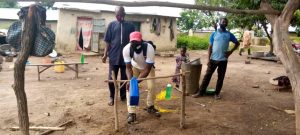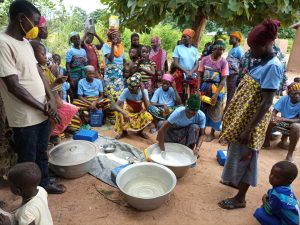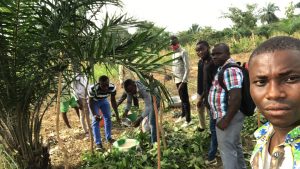Spotlight on the Global Youth Take Action projects
The projects selected to receive technical and financial support for the Global Youth to Action call for projects are already well underway. After 2 months of implementation, we are glad to present the positive impact these projects have had in their communities and the inspiring activities implemented by the youth.
The call for projects was conceived and disseminated in the midst of the first wave of the COVID-19 pandemic. Hundreds of young leaders responded to this call with creative and innovative solutions for the well-being of their communities.
Today, as several countries are entering new phases of health restrictions due to the second wave of infections and as the global number of infections has exceeded 40 million people, we hope that these projects, led by young people worldwide, will inspire and motivate other youth around the world to take action.
1. Indonesia: Millenials Fight COVID-19
After a few months of implementation, the Youth with Sanitation Concerns (YSC) team has held several meetings with 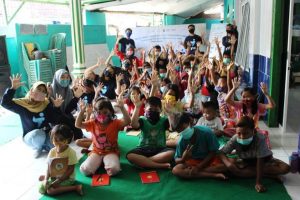 local authorities, religious leaders, community organizations, and youth to obtain their support and share information and knowledge on the COVID-19 pandemic and proper handwashing habits. A baseline survey regarding toilet facilities and handwashing habits was conducted in 84 households of Agen Gudang and the results were shared with local authorities. A focus group discussion on proper handwashing habits and the COVID-19 pandemic was held with 35 children under the age of 8 and over 20 youth. An extensive communication campaign including videos, messages broadcasted before the call for prayer, and poster materials was developed, benefiting the entire community.
local authorities, religious leaders, community organizations, and youth to obtain their support and share information and knowledge on the COVID-19 pandemic and proper handwashing habits. A baseline survey regarding toilet facilities and handwashing habits was conducted in 84 households of Agen Gudang and the results were shared with local authorities. A focus group discussion on proper handwashing habits and the COVID-19 pandemic was held with 35 children under the age of 8 and over 20 youth. An extensive communication campaign including videos, messages broadcasted before the call for prayer, and poster materials was developed, benefiting the entire community.
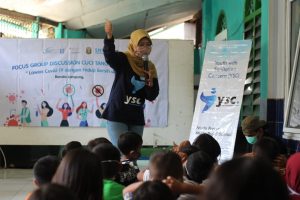 The project also aims to improve access to clean water and sanitation facilities and improve the capacity of a community-based organization to manage the public toilet facilities. The residents and the local leader have agreed to form a management committee for the operations and maintenance of the facilities. An architecture student has designed the public toilet which will be built in the upcoming months. By using art and creating a mural on the facilities, the youth aims to encourage the community to use the toilet facilities and change their behaviors.
The project also aims to improve access to clean water and sanitation facilities and improve the capacity of a community-based organization to manage the public toilet facilities. The residents and the local leader have agreed to form a management committee for the operations and maintenance of the facilities. An architecture student has designed the public toilet which will be built in the upcoming months. By using art and creating a mural on the facilities, the youth aims to encourage the community to use the toilet facilities and change their behaviors.
2. Ghana: Kyensu – Community Water Share Kiosk for Slum Households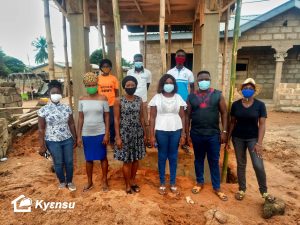
In Treba, a community on the outskirts of Ghana strongly affected by water poverty, the Ghana Youth Environmental Movement (GYEM) team has conducted a community reconnaissance and preliminary survey which included transect walks, interviews with residents, and mapping of houses and infrastructure. Following several stakeholder engagement meetings, the community including local leaders and women groups have offered their support to the project which aims to build a community water share kiosk. Focus groups discussion with the Treba Youth Association, the main partner for the project, has also been organized.
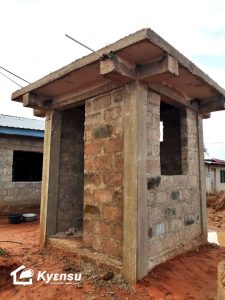
An election with the youth association was conducted to democratically elect 7 members (4 women, 3 men) as the youth water board who will ensure the long term sustainability of the project. The construction phase of the project has started and the entire structure of the water kiosk is completed. The next steps of the project include a social media water donation drive and the purchase of a water tank and filtration systems. In a few months, over 700 people will benefit from clean drinking water thanks to this innovative self-governing, self-financing, and self-sustaining youth-led project.
3. Peru: Biblioteca Sonora del Agua
The Pachapaq, for the earth team, has conducted 8 capacity-building sessions on communications with 4 youth from the Chungui and Quispillaccta communities. These rural and indigenous communities do not have safe access to drinking water nor do they have access to proper information regarding the COVID-19 pandemic. Through the mobilization of local indigenous youth, the first podcast regarding the COVID-19 pandemic was developed and broadcasted on communal radios and through loudspeakers in the localities, in their local language. A webinar was also held with the participation of specialists. Alliances were made with the Chungui and Quispillacta communities and information on ancestral knowledge was collected and will be used as input for the following podcasts. The team presented the project and podcast to the authorities of the Quispillacta, Pampamarca, Catalinayoc, and Puncupata communities, allowing for hundreds of people to gain access to adequate information regarding the pandemic. In the upcoming months, the team will continue developing podcasts and creating strategic alliances with local communities that are severely impacted by the current pandemic.
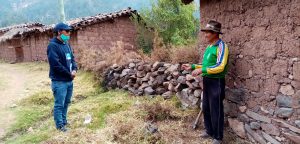
4. Madagascar: Eau’Sytech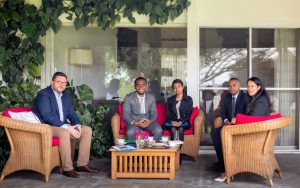
In the village of Andranovaky, the water quality test results conducted by the youth team at l’Institut Pasteur of Madagascar have shown that the water from the spring used by the community is not drinkable and presented coliform and other bacteria such as E-Coli. The team has selected 18 youth, including students, shopkeepers, local leaders, and a young pastor who will promote the use of artisanal filters in the community to increase the quality of the water consumed.
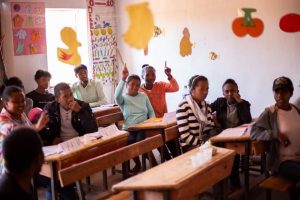
Several theoretical capacity building on different themes such as the water cycle, water-related diseases, and COVID-19 have been conducted with the selected youth. A practical workshop on the treatment of materials (sand, pebbles, charcoal) has also been conducted. Workshops regarding the assembly of the filters will be taking place shortly and the youth will then be ready to promote the use of the filters and diffuse their knowledge in the community, benefiting over 200 households.
5. Benin : L’hygiène chasse le coronavirus
The project L’hygiène chasse le coronavirus has enabled the populations of Birni and Yakabissi to gain access to better knowledge of the COVID-19 disease: modes of transmission, symptoms, prevention, referral of suspect cases for effective management thanks to the sensitization of 228 households. In addition, 200 households now have access to handwashing facilities, whose technology is mastered by the population for duplication. Finally, the ability of schools to prevent the transmission of the disease is strengthened through the sensitization of children in three schools of northern Benin to the dangers of the COVID-19 and barrier measures. In addition to the awareness-raising activities, these schools have benefited from the installation of modern handwashing kits, serving a total of 720 students.
6. Benin : STOP COVID-19 au niveau de la tête du bassin versant de la Mékrou – La jeunesse s’engage
The project is now complete. Thanks to the involvement of the entire Tandeme Génération team, they were able to mobilize and train 67 youth and 22 local elected officials in the villages and hamlets at the head of the Mekrou watershed who were able to carry the messages on good hygiene and sanitation and the measures and gestures to fight COVID-19. These young people organized sessions that were conducted in local languages in different public places, such as markets, cabarets, and places of worship.
To support the work of the youth, three posters on the measures and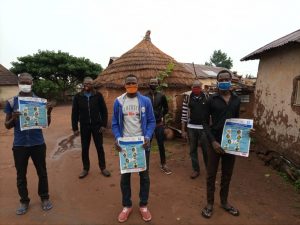 barrier gestures to fight COVID-19 were designed in local languages Bariba, Peulh, and Yom and distributed in the communities. More than 500 people were directly sensitized. Also, their action made it possible to directly train 250 young people (205 girls and 45 boys) in the manufacturing of liquid soap, handwashing devices, and face covers. These products have the potential to become a new income-generating activity and meet the needs of their families. A total of 440 L of liquid soap was manufactured and made available to schools and households, 374 face covers were made, and 50 hand-washing devices were installed in Peulh camps and households.
barrier gestures to fight COVID-19 were designed in local languages Bariba, Peulh, and Yom and distributed in the communities. More than 500 people were directly sensitized. Also, their action made it possible to directly train 250 young people (205 girls and 45 boys) in the manufacturing of liquid soap, handwashing devices, and face covers. These products have the potential to become a new income-generating activity and meet the needs of their families. A total of 440 L of liquid soap was manufactured and made available to schools and households, 374 face covers were made, and 50 hand-washing devices were installed in Peulh camps and households.
7. Togo : Projet d’appui aux jeunes pour la sécurité alimentaire et l’amélioration de leurs revenus
The project team has almost completed the construction of a borehole equipped with a solar pumping system. Following the analysis confirming the presence of water, the drilling was started, but a layer of granite extended the work, which will be completed in the following weeks. The solar pump and the drip kit will then be installed. The project team has also organized theoretical and practical training on composting, which benefited 10 young members of the association. Inputs were acquired for the realization of the compost during the practical training.
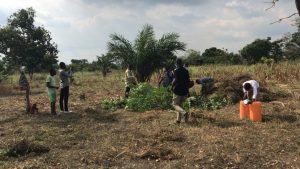
This compost has reached maturity and part of it is used for the first crops with the rainy season. As part of the fight against COVID-19, the team has been asked by the Avé prefecture to be part of a community team to carry out awareness-raising activities for the local populations in the area on barrier measures.
8. Kyrgyzstan: Green Rangers
Due to the pandemic and the on-going health restrictions in Kyrgyzstan, the project is not under implementation yet.
9. Kazakhstan: Access to safe drinking water in Kazakhstan and shared water use in Central Asia
This project aims to analyze drinking water quality standards in Kazakhstan, raise awareness of the population, and prepare recommendations to harmonize standards. The team has begun work on the map that will compile the data related to drinking water and make it accessible to the population, thus facilitating population control. They also started to prepare reports on the drinking water quality standard in Kazakstan.
The next steps will be to prepare their advocacy campaign with Kazak decision-makers and to start working on a report on the surface water quality standards in all five Central Asian countries.
Positioning young people as committed players in the water sector is at the heart of our mission, which is why we have put together this call for projects. In the same spirit, we want to present the story and unique journey of these young leaders to inspire other youth to follow in their footsteps. We are currently in the process of producing interviews with these project leaders – the videos will be published soon, stay tuned!

